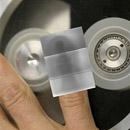X-rays detected from Scotch tape
Associated Press
Tue October 21, 2008
Area: Los Angeles
NEW YORK - Just two weeks after a Nobel Prize highlighted theoretical work on subatomic particles, physicists are announcing a startling discovery about a much more familiar form of matter: Scotch tape. It turns out that if you peel the popular adhesive tape off its roll in a vacuum chamber, it emits X-rays. The researchers even made an X-ray image of one of their fingers.
Who knew? Actually, more than 50 years ago, some Russian scientists reported evidence of X-rays from peeling sticky tape off glass. But the new work demonstrates that you can get a lot of X-rays, a study co-author says.
"We were very surprised," said Juan Escobar. "The power you could get from just peeling tape was enormous."
Escobar, a graduate student at the University of California, Los Angeles, reports the work with UCLA colleagues in Thursday's issue of the journal Nature.
He suggests that with some refinements, the process might be harnessed for making inexpensive X-ray machines for paramedics or for places where electricity is expensive or hard to get. After all, you could peel tape or do something similar in such machines with just human power, like cranking.
The researchers and UCLA have applied for a patent covering such devices.
In the new work, a machine peeled ordinary Scotch tape off a roll in a vacuum chamber at about 1.2 inches per second. Rapid pulses of X-rays, each about a billionth of a second long, emerged from very close to where the tape was coming off the roll.
That's where electrons jumped from the roll to the sticky underside of the tape that was being pulled away, a journey of about two-thousandths of an inch, Escobar said. When those electrons struck the sticky side they slowed down, and that slowing made them emit X-rays.
So is this a health hazard for unsuspecting tape-peelers?
Escobar noted that no X-rays are produced in the presence of air. You need to work in a vacuum - not exactly an everyday situation.
"If you're going to peel tape in a vacuum, you should be extra careful," he said. But "I will continue to use Scotch tape during my daily life, and I think it's safe to do it in your office. No guarantees."
James Hevezi, who chairs the American College of Radiology's Commission on Medical Physics, said the notion of developing an X-ray machine from the new finding was "a very interesting idea, and I think it should be carried further in research."





 Share your thoughts in the Forum
Share your thoughts in the Forum
